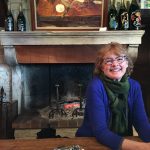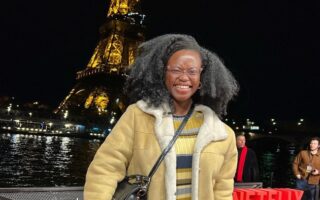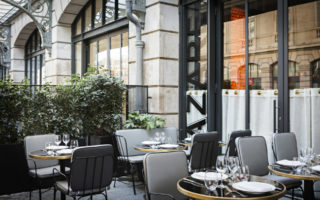Interview with Mark Pryor, Author of the “The Paris Librarian”
- SUBSCRIBE
- ALREADY SUBSCRIBED?
BECOME A BONJOUR PARIS MEMBER
Gain full access to our collection of over 5,000 articles and bring the City of Light into your life. Just 60 USD per year.
Find out why you should become a member here.
Sign in
Fill in your credentials below.
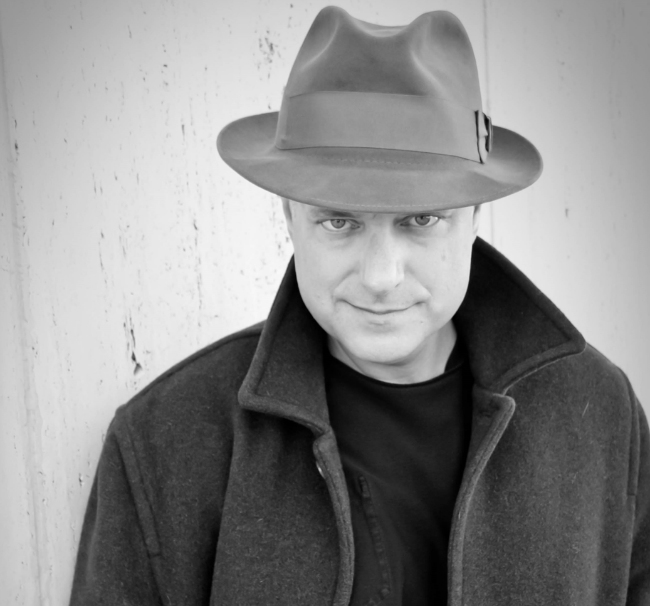
Author Mark Pryor
Mark Pryor is author of a popular and critically acclaimed series of mystery novels set in Paris, as well as several other books. He grew up in England, worked as a newspaper reporter in Essex, then moved to the United States, where he studied law at Duke University. He is currently an Assistant District Attorney in Austin, Texas, where he lives with his wife and three young children. He spends as much time as he can in Paris, and doing the research for his Hugo Marston series gives him the chance to do that quite often. “The Bookseller,” the first book in the series, was published in 2012. The latest, “The Paris Librarian,” which was just released, is set in and around the American Library in Paris. Mark recently took the time to answer Janet Hulstrand’s questions via e-mail.
Janet Hulstrand: Let’s start with your thoughts about Paris. How long have you been coming to Paris, what do you love most about it, and how did you decide to write a series of books set there?
Mark Pryor: Ah, Paris! I think we just had our fifteenth visit this year, and when we hit the streets my wife and I both sighed with relief, like we were back home. Interesting that you ask what I love, because this time I got there right after spending a few days in London, which allows me to make a fairly direct comparison. Or maybe I shouldn’t! For one thing, I noticed how crowded London has become, and how much construction there is. Paris feels so much less busy, and it doesn’t need the city-center construction because it already has the most beautiful buildings. I think for me, that’s the delight of the place, its walkability and the fact that everywhere you go you’re surrounded not by skyscrapers but by history.
The café culture, of course, is another great pleasure. I’ve seen it mimicked in other cities but nowhere is it so pervasive, so much a part of the national identity. It’s also very inspirational for me as a writer. I think of all the great authors who lived and worked there and I can go sit at Les Deux Magots and imagine they are a table or two over from me. Now you see how active my imagination is!
As for why the books are set there, it’s simply because it was while I was in Paris that I had the idea for “The Bookseller.” Sheer good luck, you might call it. My wife and I were walking beside the Seine and we stopped at a bouquiniste stall. For whatever reason, my mind started working and I wondered if and why someone might want to kidnap or murder a bouquiniste. Once the gray cells got to work the idea quickly formed, and we dashed to a nearby tabac to buy a pen and paper so I could write it down. In a café, sipping coffee of course. Now, some people have claimed I set the books in Paris as an excuse to visit every year, which is clearly a terrible fabrication and nothing I would ever consider doing…
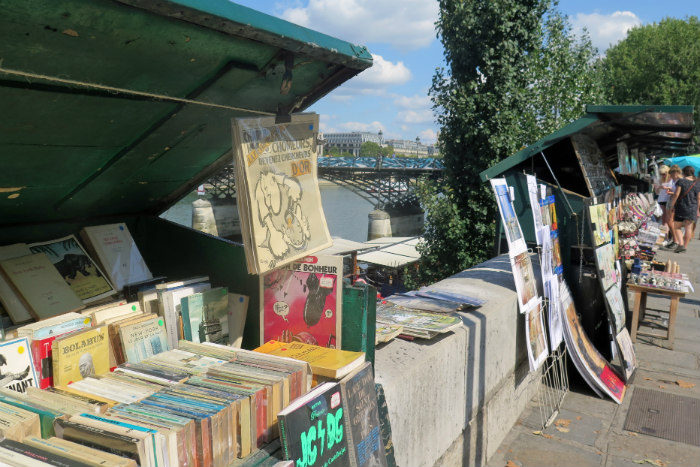
The bouquinistes of Paris by Peter Olson
JH: For those readers who may be just learning about your books, can you tell us a little bit about Hugo Marston, the protagonist of your series of mysteries set in Paris?
MP: Yes, I’d be delighted to. Hugo is a former FBI profiler who now works as head of security at the US Embassy in Paris. He’s something of an old-fashioned hero, a good-looking guy but he’s not a womanizer or inclined to dramatic heroics. As I put it in “The Bookseller,” he’s a watcher, not a player. He’s also a devoted reader and has a small collection of rare books, which he adds to from time to time. His intellectual curiosity and his FBI training both mean that he’s much more likely to solve a case by talking to people than by chasing them down. Sure, he can fight and shoot when he has to, but like Sherlock Holmes, one of his heroes, Hugo finds it more satisfying and more effective to unwind a puzzle in his mind before putting himself or others in danger.
Does all that make him sound less-than-exciting? Hopefully not, but in case anyone is worried, he does have Tom. Tom Green is Hugo’s best friend and biggest pain. They met at the FBI Academy and hit it off, and a decade later they are still inseparable. Well, that is until Tom goes off on one of his jaunts, doing freelance work for the CIA– usually without bothering to say good-bye. Tom is the one who keeps Hugo on his toes. Tom drinks and chases women, he swears, and he tries to get Hugo to go along with his hijinks. But when it comes down to it, he’s there for Hugo no matter what and no matter where.
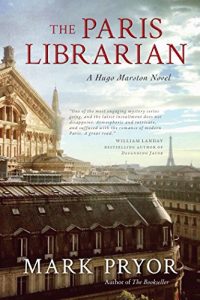
“The Paris Librarian” by Mark Pryor
JH: Your latest book, “The Paris Librarian,” is set in the American Library in Paris. What made you think of setting a mystery there?
MP: I really enjoy Hugo’s love of books and, it turns out, so do my editor and my readers! Writing “The Bookseller” was a great way to introduce that passion of Hugo’s, and I wanted to return to the book theme, so it made sense to me to set a story in and around the American Library. I did check with them first, of course, and they were delighted to have someone killed in their library. In fact, they suggested I come by for a visit, so of course I did. They gave us a fabulous tour of the library, which resulted in my discovering a little room in which to stage my murder, AND a real secret door! Seriously, I promise it’s true. Naturally, I worked that into the story, how could I not?
JH: What is the hardest thing about writing a mystery? What is the most fun?
MP: The hardest thing is getting the balance of clues right, and the pacing. For the clues, I have to make sure that I leave enough so that the reader isn’t totally blindsided when they find out who did it. But I also have to make sure that it’s not blazingly obvious who the killer is. I usually lay down a lot of clues in the first draft and then, if it seems too easy, I will take them out as I go through second and third edits. Of course, having a great editing team at Seventh Street Books helps with that.
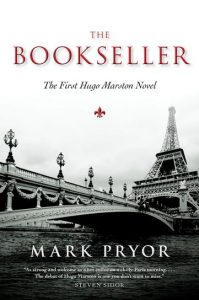
“The Bookseller” by Mark Pryor
The pacing can be a challenge, too. I don’t write thrillers packed with car chases, fights, and gun battles so I have to make sure the book isn’t too “talky.” I like to change locations within Paris quite a lot, which helps, giving the reader as much flavor of the city as I can. A little love interest here and there helps, too, and I have the wonderful Claudia Roux to help with that.
The most fun of all, to be perfectly honest, is meeting readers of the series. I’m lucky to have fairly good turnout at events, and I love the questions that people have, and just getting to hang out and chat with them before and after is hugely enjoyable and rewarding.
As for the writing, I do have fun coming up with the ideas, sitting around and noodling vague thoughts until they suddenly coalesce into a solid idea. Those are the aha! moments that I love. Of course, doing the research, forcing myself to sip an Americano at a café in Paris of an evening isn’t too much of a hardship, either.
JH: To me it is amazing that anyone can think up a mystery and have it all come out right. I must confess I usually have quite the challenge simply keeping up with who did what, and how they managed to do it. Can you talk about the writing process a bit, especially in relation to writing mysteries? For example, where, or how, does a story usually begin for you? Is it with the image of a place? An event? A character? Is it the same every time, or different with each book? And do you map out the plot completely before you start actually writing, or is it an organic process that evolves as you write?
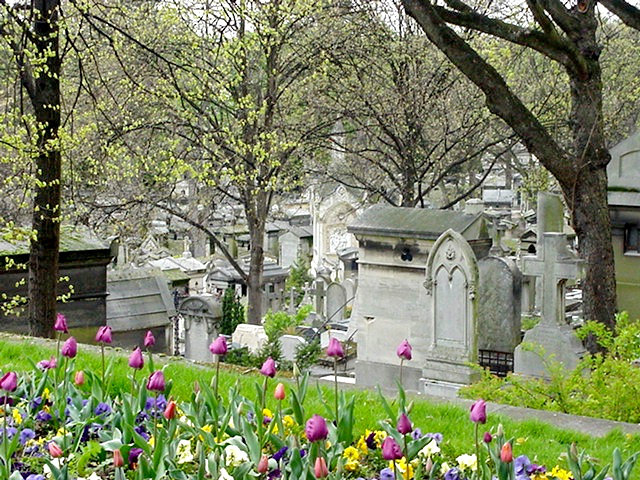
Looking down the hill at Père Lachaise by Näkymä Père-Lachaiseen/ Public Domain
MP: Great question. For me the writing process begins with an idea for a murder. Before I put pen to paper, or finger to keyboard, I work out in my head who is murdered, who killed them, and why. But I also like to isolate a context and focus on that, make it an integral part of the story. For example, in “The Bookseller” it’s not just that a bouquiniste named Max gets kidnapped: no, the story swirls around all of the city’s bouquinistes. Likewise in the second book, “The Crypt Thief,” even though the first murder happens at Père-Lachaise, the whole book centers in and around the city’s other magnificent cemeteries. And in “The Paris Librarian,” I wanted to do two things: attempt a locked-room mystery, and return to the book theme. Hence the American Library in Paris as a setting.
Once I have the basics straight in my mind I can get to work. I don’t really plot my novels in advance, it’s just not a system that works for me. I have to discover things as my characters do, and I am more creative if I sit down and let the story unfold more organically. The one time I tried plotting a novel in advance, the book came out entirely different when I wrote it, which means all I managed to do with the plotting was to waste time. So I’ll pick a place to start and just get on with it, take myself off to the local library or a coffee shop, as if I’m going to the office, so that I don’t goof off like I would at home. Although, just this week I’ve been writing in the evenings because my wonderful agent, Ann Collette, sent me a little device that fills the room with the scent of mint. She promised me it would get my creative juices flowing, and I have to say, she was right!
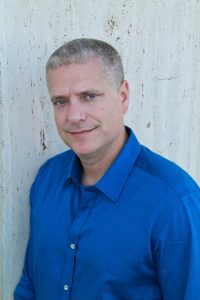
Author Mark Pryor
JH: What’s next for you? Is there another Hugo book coming? Also, are Hugo and Claudia ever going to take that step of “tying the knot”? Some of us are dying to know…
MP: I have a contract with my publisher for at least more three Hugo books, and I tell people that as long as I have readers I’ll keep writing them, I do so enjoy it. But I’ll keep working on other things, too. I just got back from Amsterdam, researching a historical novel I plan to set there, during World War II. I’ve always been fascinated with that period, and would love to attempt a murder-mystery set there and then. I have the general idea in mind, now it’s a matter of finding time to devote to it. But it’ll happen!
As for Hugo and Claudia, well, you’ll have to wait and see. Or perhaps, read and see. They are two very independent people, so tying the knot would be quite a step. Heck, just getting off the on-again, off-again dating roundabout would be a start for them! I do love playing with their relationship as a writer, though, because it’s great way to develop Hugo, to peer into his psyche. He’s not one for opening up easily but he’s also a romantic, and he does so adore Claudia. A reader asked me a brilliant question just this week: Who will be the first of them to say, “I love you”? I’m not sure I even know the answer to that question myself yet, but I think it’ll be a good example of organic storytelling– the answer will come to me as I write that scene. Now, to decide which book that will be in…
Lead photo credit : Author Mark Pryor
